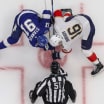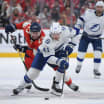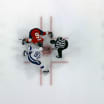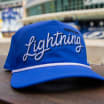As referenced in last week's column about the Lightning's 2018 first round series win over New Jersey, the race for the top spot in the Atlantic Division during the regular season had gone down to the wire. The Lightning finished one point ahead of the Boston Bruins, thanks to a Florida Panthers win at Boston in a makeup game that was played the day after the regular season had ended.
Mishkin's Musings: Bolts bounce Bruins in 2018 second round
Dave Mishkin takes a look back at the 2018 playoff series between the Atlantic Division rivals
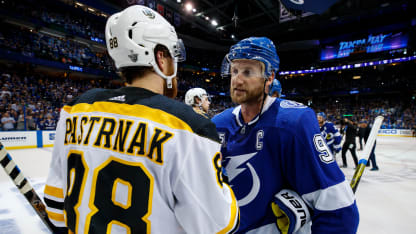
© Scott Audette/Getty Images
As a result, the Lightning faced the Devils in the first round and Boston saw third-place Toronto. While the Lightning ousted the Devils in five games, the Bruins had a more difficult time with the Maple Leafs. After building a 3-1 series lead, Boston lost Games Five and Six. In Game Seven, the Bruins entered the third period trailing the Leafs, 4-3. But Boston rallied, scoring four third period goals. The series win over Toronto set up a second round matchup against the Lightning.
The teams had met four times during their regular season series. And while their standings race had been close, the head-to-heads, at least through the first three games, had not been. The Bruins controlled most of the action in a 3-2 home win that took place in late November. The final three contests occurred during the closing weeks of the regular season. On March 17, the Bruins came into Tampa, held the Lightning to just 23 shots, and shut them out, 3-0. Twelve days later in Boston, the Bruins stormed out to a 2-0 first period lead, outshooting the Lightning, 17-6, during the opening 20 minutes. At that point in the season series, the Lightning had played seven average-to-subpar periods against Boston. Although they ended up losing the game, 4-2, they played better in the final two periods. Including a middle stanza in which they outshot Boston, 11-3. Still, heading into the final regular season matchup against the Bruins, the Lightning knew they hadn't yet showed Boston their best. That finally happened on April 3 at Amalie Arena. The Lightning scored three second period goals and cruised to a 4-0 victory.
Details from a regular season series are typically irrelevant to what will happen when the same two teams meet in the playoffs. But in this case, the April 3 triumph was an important one for the Lightning. Not only did they win the game, they played very well in it. The sort of performance they would need in a postseason matchup against an excellent opponent.
Unfortunately, the Lightning did not deliver that type of performance in Game One, a 6-2 home loss. Versus the Devils, the Lightning had matched a line of Brayden Point, Tyler Johnson, and Ondrej Palat against New Jersey's top line of Taylor Hall, Nico Hischier, and Kyle Palmieri. In the Lightning's five-game series victory, the Point line had effectively limited the damage from Hall and his linemates. In Game One against the Bruins, Point's line went head-to-head against Boston's prolific line of Patrice Bergeron, Brad Marchand, and David Pastrnak.
This Bergeron line was - and still is - one of the best in the NHL. All three players are crafty, skilled, tenacious, and smart. Each one intuitively knows what the other two are doing, so they are constantly in motion and constantly in synch. Defenders cannot let their guard down for even an instant. In Game One, that line scorched the Lightning. The three players combined for 11 points. Boston's first goal was a power play marker, but the other five all came at even strength (including an empty-netter). Even though the Lightning held Boston to just 24 total shots - only 11 over the final two periods - they yielded prime scoring chances on the shots they did allow. Point was minus five in Game One. Palat took a minus four and Johnson a minus three.
Heading into Game Two, Jon Cooper had a decision to make. Would he keep matching Point's line against the Bergeron unit? Maintain the same line combinations but go with a different matchup? Or put his lines in a "blender" and mix it all up?
He stood pat. Point, Palat, and Johnson not only were kept intact as a line, they again drew the Bergeron assignment. At 11:47 of the first period, the Lightning got their first lead of the series. During a power play, Yanni Gourde accepted a cross-ice pass from Point and finished a left circle shot. A few minutes later, the Lightning had to kill a long five-on-three. They got through both kills, but eventually yielded a five-on-five goal to Charlie McAvoy off the rush before the period ended. The game remained tied at one until just half the midway point of the second period. Out of the defensive zone, Palat whipped the puck off the boards to Point, who raced down the left wing ahead of McAvoy. Matt Grzelcyk had to cover for McAvoy, which left Johnson open in the middle of the ice. Point fed Johnson, who floated a knuckler past Tuukka Rask.
In the third period, the Lightning effectively dictated play and limited Boston's possession time. With just under six minutes left, they extended their lead. Marchand's attempted drop pass from the neutral zone was an errant one. Point stole the puck and passed to Palat, who zipped a left circle shot over Rask's glove. The Palat tally proved to be an important one because Torey Krug scored at 15:58. But the Bruins would get no closer. In fact, Krug's goal was Boston's final shot on net in the game. Point sealed things with an empty-netter in the final minute.
Cooper's decision to stand pat paid off. Point posted a goal and three assists. Johnson and Palat also contributed goals. All three players finished with a plus two rating. As a team, the Lightning held the Bruins to just 20 shots - and, unlike in Game One, kept Boston's scoring chances to a minimum.
The Bruins and their fans were pumped up to begin Game Three. But the Lightning quieted things down quickly. Before the game was even four minutes old, Palat had scored twice and the Lightning had a 2-0 lead. On the first tally, Anton Stralman flipped the puck into the Boston end. Grzelcyk attempted to knock it down. But he fumbled the puck - and then lost track of it. That miscue led to a two-on-one for Johnson and Palat - Palat finished his chance into an open side of the net at 1:47. On the next shift for that line, Johnson won an offensive zone faceoff and moments later, Palat deflected in Victor Hedman's point shot.
The early Palat goals were a big key to the Lightning's eventual Game Three victory. But there were other important twists and turns that would still occur before the opening period ended. Still in the first, the Lightning received two consecutive power play chances. But they didn't score on either. Then, just over a minute after the second of those ended, the Bruins went on the power play. Bergeron immediately scored - he jumped on a loose puck in the slot and snapped a shot into the net at 14:12. It was potentially a momentum-swinging goal, particularly after the Bruins had successfully killed off those two penalties earlier. But they wouldn't get the chance to build any momentum. Off the rush, Yanni Gourde passed the puck to an open Anthony Cirelli in the slot. Rask stopped Cirelli's first shot. But Cirelli grabbed the rebound and roofed the puck into the top of the net. It was Cirelli's first career postseason goal and it gave the Lightning a 3-1 lead after one.
Even though the Bruins still had 40 minutes left to mount a comeback, the Lightning clamped things down. They held the Bruins to 15 combined shots in the second and third periods. Just as importantly, they stayed out of the penalty box. In Game Three, the Bruins only had a single power play chance, the one that resulted in their only goal. Steven Stamkos finished the scoring, tallying an empty-netter in the final minute while the Lightning were on the power play.
Essentially, the Lightning won Game Three in the first period. The two Palat goals gave them an early lead and Cirelli's "answer" strike was a gut-punch tally. Game Four started similarly for the Lightning - they took a multi-goal lead in the first period. At 4:36, Point scored a highlight reel goal. While on the backcheck, he stole the puck in neutral ice and turned back into the offensive zone. He sped around Zdena Chara, cut in front, and stuffed a shot past Rask. About five minutes later, Nikita Kucherov made it 2-0.With the Lightning on a power play, Kucherov ripped a one-timer from the right circle into the top of the net - a perfect shot over Rask's left shoulder. As they did in Game Three, the Bruins cut into the Lightning lead with a power play goal late in the first. Pastrnak swatted a rebound from the left circle into the net.
It was at this point, however, that the Game Four storyline diverged from the one we had seen in Game Three. The Lightning weren't able to re-establish a two-goal lead before the period ended. And they were unsuccessful in staying out of the penalty box. In the opening minute of the second period, the Bruins received another power play and Bergeron snapped in a shot from the right circle at 2:04 to tie the game. That goal sparked the Bruins, who dominated play in the middle stanza. They outshot the Lightning, 14-4, but Vasilevskiy helped his team get out of the period still in a 2-2 tie.
But eventually, the Bruins got the lead. With the Lightning on the power play, Marchand and Bergeron countered on a shorthanded rush. Bergeron redirected Marchand's pass into the Lightning net and the Bruins had a 3-2 lead. Soon after, the Lightning took a penalty and the Bruins, already with two power play goals scored in the game, had a chance to extend the lead. But the Lightning killed it off to keep the deficit at one. And then they went to work. Over the final 10 and a half minutes of the third period, the Lightning outshot the Bruins, 9-2. One of the nine went in. It was from their Captain. Steven Stamkos scored a dramatic goal with 7:04 left to tie it. From Boston's perspective, it was also a controversial goal. Moments before Stamkos scored, McAvoy had the puck behind the Boston net. He attempted to skate it up the left wing. Kucherov was trailing McAvoy and briefly put his hand on McAvoy's left arm. The Boston defenseman lost his balance. McAvoy and the Bruins felt there should have been a penalty called on the play. The officials disagreed. J.T. Miller stole the puck and quickly fed Stamkos in the slot. Stamkos blistered a one-timer past Rask.
Game Four went to overtime and, at the 3:18 mark, the Lightning won it. The goal featured a sequence in which two(!) Lightning defensemen both made smart pinches. With the puck in the Boston end, Ryan McDonagh skated from the right point to the right circle. As a result, he prevented Ryan Donato from getting to the puck and clearing it. Yanni Gourde jabbed it back to Alex Killorn, who was covering the right point for McDonagh. Killorn and Gourde exchanged passes as they switched spots. Gourde veered back to the right point as Killorn brought the puck to the right circle. At the same time as McDonagh headed back to the blue line, Dan Girardi charged to the front of the net. Killorn's centering feed hit off Brian Gianta's skate, deflected off Girardi's stick, and went into the Boston net.
It was a stunning finish to the back-and-forth contest. And suddenly, the Lightning were within a game of eliminating the Bruins. On the afternoon of Sunday, May 6, that's exactly what happened. But Game Five didn't start especially well for the Lightning. They squandered two early power play chances and later in the first period, took overlapping penalties that led to a long five-on-three for Boston. The Lightning got through the two-man disadvantage, but couldn't escape the overall kill unscathed. Moments after Girardi came out of the box to join the other three penalty killers, David Krejci scored off a one-timer from the left circle at 19:12. At the time, the Lightning had three defensemen on the ice, because Hedman and Braydon Coburn were out for the five-on-three. They never got fully organized for the five-on-four portion of the kill.
Down 1-0 after one, the Lightning rallied in the second. Point made an offensive zone steal and set up Miller for a right circle shot. The rebound came into the slot, where Point grabbed it and slid a backhander past Rask to tie the game at 10:43. Before the period was up, the Lightning had a lead. Bergeron took a penalty at 13:31 and twenty-nine seconds later, the Lightning cashed in. Kucherov and Miller passed the puck back and forth as they moved between the right circle and right corner. Eventually, Kucherov from the corner fed Miller at the circle and Miller one-timed a shot into the net. The second period swing meant that the Lightning took a lead into the final frame. In that pivotal middle stanza, the Lightning held the Bruins to just five shots.
Predictably, the Bruins tried to make a push in the third. They fired 14 shots on net. Vasilevskiy stopped them all. The Lightning took a penalty with 4:18 remaining. But they killed it off. With 1:33 left, Vasilevskiy made what would turn out to be his final save of the series, a stop on Pastrnak. The Bruins pulled Rask for the extra attacker. The faceoff was to take place between Point and Bergeron. Bergeron won the draw, but it hit off the skate of Rick Nash and ricocheted to Stralman, who was standing close to Vasilevskiy. Stralman hurried the puck down the ice and into the empty Boston net. And that was it. A series between two of the top teams in the league turned out to be much shorter than many expected.
How did the Lightning do it? As is typically the case, there were several factors. They helped their cause in Games Three and Four by jumping out to an early lead (although they would eventually have to rally in Game Four). They delivered big plays at key times. The Game Two goals from Johnson and Palat. The first period tallies in Game Three from Palat and Cirelli. In Game Four, it was Stamkos' tying goal and Girardi's OT winner. And in Game Five, the second period goals from Point and Miller proved to be the difference. Vasilevskiy, after allowing five goals in Game One, held the opposition to just seven goals over the next four contests.
But the biggest storyline from this series was how the Lightning responded defensively after their Game One defeat. Point, Johnson, and Palat deserve credit for their work against the Bergeron line. Point finished the series with a plus two rating. As already mentioned, he was minus five in Game One. He was also on the ice for McAvoy's first period goal in Game Two. From that point on, he went plus eight in the series.
But ultimately, this was really a team-wide defensive effort against the Bruins. In Games Three, Four, and Five, the Bruins didn't tally a single even-strength goal.
It was an impressive victory for the Lightning against a top-notch opponent. They would be seeing another one when they faced Washington in the Eastern Conference Final.


